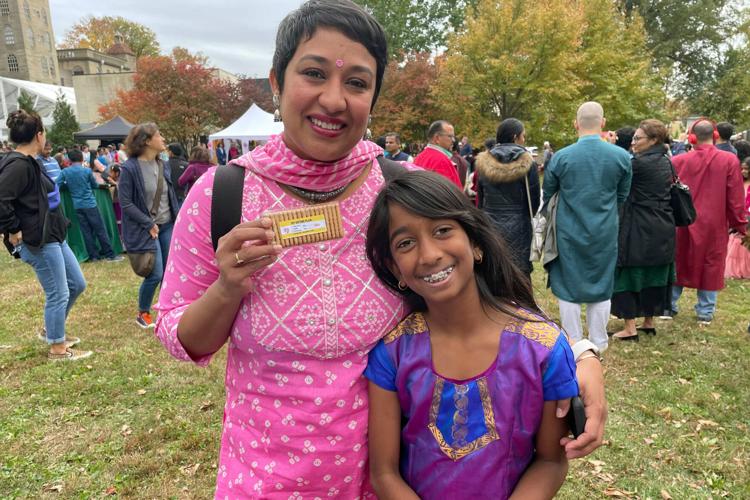CHICAGO — Leading up to the 2020 election, Facebook ads targeting Latino and Asian American voters described Joe Biden as a communist. A local station claimed a Black Lives Matter co-founder practiced witchcraft. Doctored images showed dogs urinating on Donald Trump campaign posters.
These false claims scorched through social media sites that advocates say fueled election misinformation in communities of color.
As the 2024 election approaches, community organizations are preparing for what they expect to be a worsening onslaught of disinformation targeting communities of color and immigrant communities.
"They're getting more complex, more sophisticated and spreading like wildfire," said Sarah Shah, director of policy and community engagement at the advocacy group Indian American Impact, which runs Desifacts.org, a fact-checking site for South Asian Americans. "What we saw in 2020, unfortunately, will probably be fairly mild in comparison to what we will see in the months leading up to 2024."
Shah said the group is drawing inspiration from 2022 projects, including a voting toolkit using memes with Bollywood characters and passing out Parle-G crackers with voting information stickers at Indian grocery stores.

The advocacy group Indian American Impact passes out Parle-G cookies with voting plan stickers Oct. 23, 2022, at a Diwali even in Doylestown, Pa.
A growing subset of communities of color, especially immigrants for whom English is not their first language, are questioning the integrity of U.S. voting processes and subscribing to Trump's lies of a stolen 2020 election, said Jenny Liu, mis/disinformation policy manager at the nonprofit Asian Americans Advancing Justice. Still, she said these communities are largely left out of conversations about misinformation.
"When you think of the typical consumer of a conspiracy theory, you think of someone who's older, maybe from a rural area, maybe a white man," she said. "You don't think of Chinese Americans scrolling through WeChat. That's why this narrative glosses over and erases a lot of the disinformation harms that many communities of colors face."
In addition to general misinformation themes about voting machines and mail-in voting, groups are catering their messaging to communities of color, experts say.
For example, immigrants from authoritarian regimes in countries like Venezuela or who have lived through the Chinese Cultural Revolution may be "more vulnerable to misinformation claiming politicians are wanting to turn the U.S. into a Socialist state," said Inga Trauthig, head of research for the Propaganda Research Lab at the Center for Media Engagement at the University of Texas at Austin. People from countries that have not recently had free and fair elections may have a distrust of elections and authority that may make them vulnerable to misinformation as well, Trauthig said.

Laura Zommer and Clara Jiménez Cruz of the Spanish-language fact-checking group Factchequeado sit on a panel April 1, 2022, at the 2022 International Symposium on Online Journalism in Austin, Texas.
Disinformation efforts often hinge on topics most important to each community, whether that is public safety, immigration, abortion, education, inflation or alleged extramarital affairs, said Laura Zommer, co-founder of the Spanish-language fact-checking group Factchequeado.
"It takes advantage of their very real fear and trauma from their experiences in their home countries," Zommer said.
Other vulnerabilities include language barriers and a lack of knowledge of the U.S. media landscape and how to find credible U.S. news sources, several misinformation experts told The Associated Press. Many immigrants rely on translated content for voting information, leaving space for bad actors to inject misinformation.
Disinformation, often in languages like Spanish, Mandarin or Hindi, flows onto social media apps like WhatsApp and WeChat heavily used by communities of color.

Olivia Rivarola, left, Factchequeado social media and communications manager, and Paula Martinetti, special projects analyst, work from Buenos Aires, Argentina, on Nov. 8, 2022, the night of the 2022 U.S. Midterm elections, with Factchequeado's co-founder Laura Zommer.
Misinformation also can arise from mistranslations. Nonprofit think tank The Brookings Institute found examples of mistranslations in Colombian, Cuban and Venezuelan WhatsApp groups, where "progressive" was translated to "progresista," which carries "far-left connotations that are closer to the Spanish words 'socialista' and 'comunista.'"
Messages on WhatsApp are encrypted and can't be easily seen or traced by moderators or fact-checkers.
Randy Abreu, policy counsel for the National Hispanic Media Coalition, which leads the Spanish Language Disinformation Coalition, also raised concerns about Spanish YouTube channels and radio shows that are growing in popularity. He said the coalition is tracking more YouTube and radio personalities who are spreading misinformation in Spanish.
A 2022 report by the left-leaning watchdog group Media Matters tracked 40 Spanish-language YouTube videos spreading misinformation about U.S. elections. Many remained on the platform despite violating YouTube election misinformation policy, the report said.

María Teresa Kumar, founding president of the nonprofit advocacy group Voto Latino, delivers opening remarks Aug. 28, 2019, at a summit in Austin, Texas.
Amid changes in voting policies at state and local levels, advocates are sounding the alarm on how disinformation about voting in 2024 may target communities of color. Many of these efforts surged as Asian American, Black and Latino communities grew in political power, said María Teresa Kumar, founding president of the nonprofit advocacy group Voto Latino.
"Disinformation is, at its core, meant to be a sort of voter suppression tactic for communities of color," she said.
Advocates are urging social media companies to invest in content moderation and fact-checking in languages other than English. Government and election officials should also make voting information more accessible to non-English speakers, organize media literacy trainings in community spaces and identify "trusted messengers" in communities of color to help approach trends in misinformation narratives, experts said.






